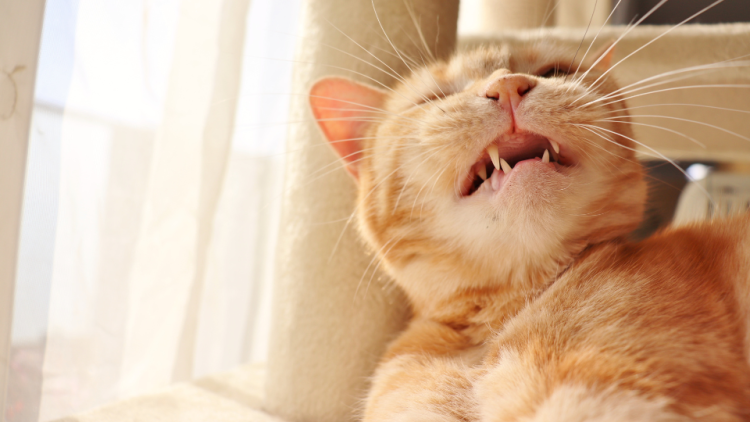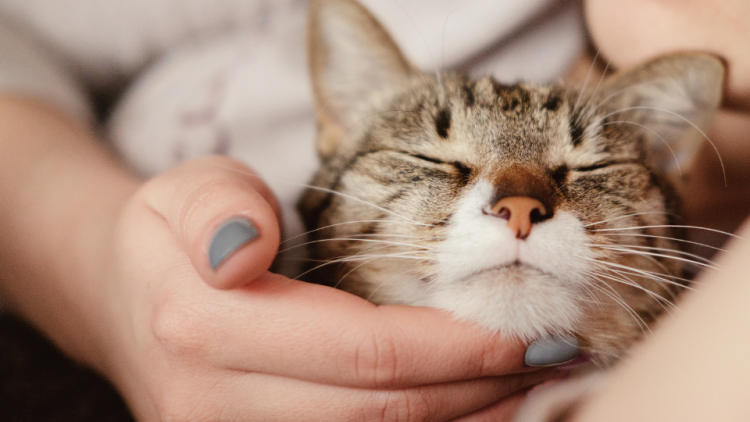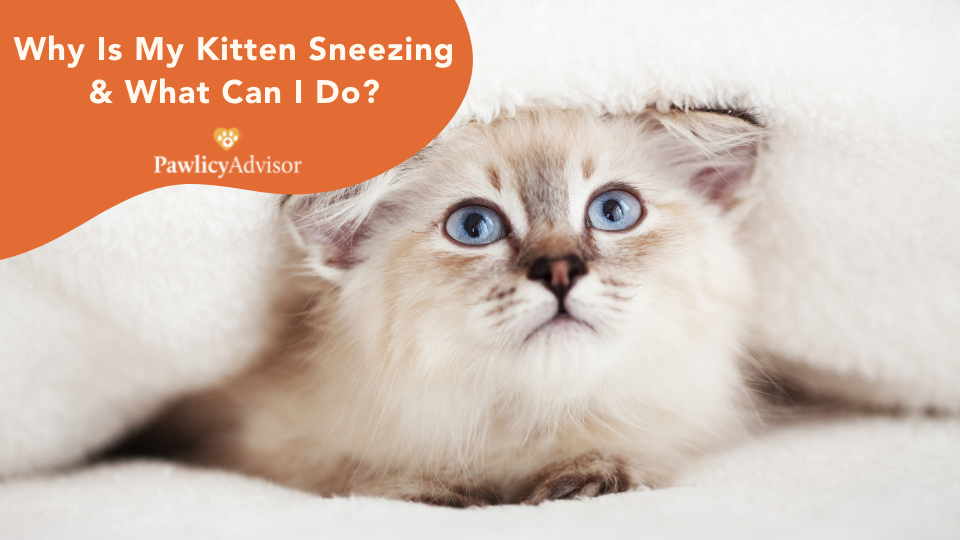If your kitten is sneezing a lot, it might be a sign of upper respiratory infection. Sneezing and coughing are often signs of upper respiratory infection (URI) in kittens, which can develop into feline asthma that may linger for life if left untreated. Other, more serious health issues can also cause the same symptoms seen in sneezing cats.
Protect Your Kitten with Pet Insurance Is Cat Health Insurance Worth It?
In this post, we explain the possible reasons why your kitten keeps sneezing and offer advice on how you can help your pet. Here’s what we’ll cover:
- Why is my kitten sneezing a lot?
- How do I know if my cat has a respiratory infection?
- How much sneezing is too much for a kitten?
- When should I worry about my kitten sneezing?
- Will cat sneezing go away on its own?
- How do you treat a respiratory infection in kittens?
- What can I do to help my sneezing cat at home?
- How much does it cost to treat respiratory infections in kittens?
Why is my kitten sneezing a lot?
There are several reasons why your cat is sneezing a lot. Here are the most common culprits:
Upper respiratory infection
If your cat is sneezing a lot, it’s likely due to an upper respiratory infection (URI). These infections are very contagious and are relatively common in cats and kittens, especially those recently adopted from shelters.
In addition to sneezing, other common symptoms of a URI in cats are:
- Runny eyes
- Nasal discharge
- Coughing
- Wheezing
- Decreased appetite
- Dehydration
- Drooling
- Lethargy
- Difficulty breathing
- Enlarged lymph nodes
In many cases, these symptoms will resolve on their own after about a week, but more chronic or more severe URI cases can last for a few weeks or continue on and off for the rest of your cat’s life.
Bacterial, fungal, or viral infections
Other infections like feline calicivirus and feline herpes virus can also be the reason your cat sneezes. Both viruses are highly infectious, spread rapidly among cats, and often lead to secondary health problems that can trigger sneezing. A cat with herpes, for instance, may acquire a secondary bacterial infection or conjunctivitis.
Vets often prescribe antibiotics to treat these conditions. Thankfully, both calicivirus and herpesvirus vaccines are available, and they are included in the kitten vaccine series recommended by vets.
Other infections that can lead to sneezing in kittens include Feline leukemia, Feline Immunodeficiency Virus (FIV), Feline infectious peritonitis, Bordetella, Mycoplasma, and Chlamydia.
Allergens and inhaled irritants
If your kitten only sneezes from time to time, the cause might be irritation of the nasal passages. Look for patterns: Does your feline friend start sneezing after you have cleaned the house? After leaving the litter box? Does sneezing occur whenever you’re using your favorite perfume?
Here’s a list of the most common substances that might cause irritation or allergic reaction in kittens:
- Pest spray
- Perfume
- Cleaning agents
- Cat litter
- Cigarette smoke
- Pollen
- Dust
- Candles
- Mold
If sneezing is a result of environmental allergies, the majority of cats will also have itchy skin lesions. Feline asthma can also be triggered by allergens like pollen or dust mites. Asthma in cats usually causes persistent cough and/or sneezing, and might have difficulty breathing.

Other causes of sneezing
Sneezing in cats can be caused by a variety of factors, such as a common cold, a blockage in their nasal passages or an infection or inflammation of a dental root. Sneezing is also frequent in kittens within four to seven days of having an intranasal immunization. This sneezing usually only lasts a few days.
In rare cases, sneezing might be an indication of cancer or heartworm in cats.
How do I know if my kitten has a respiratory infection?
If you suspect a feline URI, be sure to take your kitten to a nearby vet. Only they can diagnose an upper respiratory infection in your kitten Note that both outdoor and indoor cats can get respiratory infections, so you can never assume your cat is fine based on their living environment.
To evaluate whether your kitten has a respiratory infection, watch for other symptoms, such as:
- Cough
- Runny or stuffy nose
- Eye and nasal discharge
- Fever
- Drooling
- Loss of appetite
- Oral or nasal ulcers
- Lethargy
- Depression
Ultimately, only your vet can diagnose your kitty's case and recommend therapies to improve it.
Symptoms of URI in Kittens
The symptoms of URI are very easy to miss and therefore neglect because cats can be masters at concealing pain. If you're worried your pet might have an upper respiratory infection, keep an eye out for these common clinical signs:
- Continuous diarrhea
- Repeated vomiting
- Body temperature under 99°F or over 103°F
- Decreased appetite
- Losing weight or failing to gain weight
- Dehydration
- Lethargy
- Pale gums
- Constant crying
- Bleeding
How much sneezing is too much for a kitten?
If your kitten sneezes every once in a while, don't worry. Just like humans, cats forcefully expel the air from their nasal passages as part of the immune system's response to allergens, or response triggered by an irritant they inhaled.
An occasional cat sneeze is natural and no cause for concern, but if the sneezing occurs multiple times per day and persists for multiple days in a row, it could be a red flag that suggests your furry friend is dealing with an infection.
When should I worry about my kitten sneezing?
If your kitten is sneezing from time to time with no other symptoms or very mild symptoms, don't start worrying about their health quite yet. Keep your feline friend inside and monitor their behavior for other signs of sickness.
If the sneezing continues or is accompanied by other symptoms — such as decreased activity, discharge from the nose and eyes, loss of appetite, or the presence of blood or mucus in the nose — a trip to the veterinarian is almost always necessary for accurate diagnosis and treatment.
Will a cat's sneezing go away on its own?
The underlying cause of upper respiratory infections in kittens is viral, meaning it cannot be treated by antibiotics and will require time for the cat's immune system to naturally run its course.
With supportive care, most cases of URI resolve themselves between one to three weeks' time; without it, your pet may show little to no signs of improvement, and the infection could turn into a chronic, life-long condition.
If your kitten's URI leads to a secondary bacterial infection, your veterinarian may recommend additional treatment measures.
How do you treat a respiratory infection in kittens?
Treatment will depend on the severity of your kitten's upper respiratory infection. In mild cases, your vet may recommend simple measures to make your cat more comfortable, such as using a humidifier with other methods of supportive care at home.
In other cases, steroids, antihistamines, fluids, or antibiotics may be necessary. In rare cases, cats that do not respond to medical treatment may require surgery. Also, if your sneezing cat develops pneumonia or becomes severely dehydrated, hospitalization may be required.

What can I do to help my sneezing cat at home?
Supportive care for kittens with a URI includes:
- Making sure the kitten isn't dehydrated. Kittens with severe URIs may be unable to suckle or eat, resulting in dehydration. If the kitten is dehydrated, provide more fluids.
- Monitoring your pet’s appetite to ensure they are getting adequate calories. Kittens with severe URIs may be unable to nurse or latch and might need to be fed with a syringe or tube.
- Using a nebulizer prescribed by your vet to help open the cat’s airway. You can also place your four-legged friend outside of a hot steamy shower for about ten minutes.
- Gently wiping the nose and eyes with a warm compress to soften and remove any crust. If the eyes are crusty and filled with yellow-green mucus, consult a veterinarian about administering an ophthalmic antibiotic.
NOTE: Some pet parents might try to treat feline URIs with DIY methods like probiotics or apple cider vinegar, nettle and marigold tea, but these natural remedies lack scientific proof to support their safe and effective use in cats.
Only your veterinarian can diagnose your kitten’s condition and prescribe suitable therapy.
How much does it cost to treat respiratory infections in kittens?
An upper respiratory infection in cats can be treated for as low as $100 by having your pet examined by a vet and given adequate medicine. However, if your cat needs a lot of treatments, such as fluids to rehydrate, the treatment might increase to $300. In rare cases, if the medication is pricey and administered for a long time, the total spending can reach over $500.
Enrolling your cat in pet insurance is the best way to lower the cost of vet bills. Pawlicy Advisor can help you compare pet insurance plans from different providers side-by-side so you can easily find the one that meets your needs.
Protect Your Kitten with Pet Insurance Is Cat Health Insurance Worth It?
Key Takeaways
- If your kitten is sneezing a lot, it might be a sign of upper respiratory infection, but other common reasons include inhaled irritants and allergens, as well as other infections like FIV, feline calicivirus, and feline herpes.
- If your cat sneezes occasionally, there’s probably no reason to worry. However, if the sneezing persists or is accompanied by other cold-like symptoms in cats (such as coughing, loss of appetite, runny nose, watery eyes, etc.), it’s best to have your kitten examined by a vet.
- With your vet’s help and some supportive care at home, your cat should recover soon. Pet insurance can help you protect your budget while always providing the best care for your feline friend.
